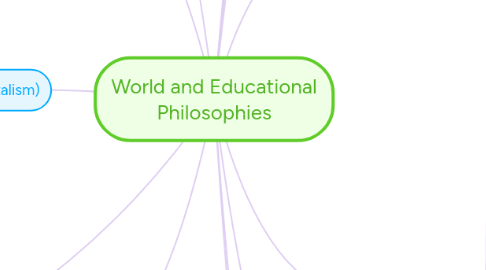
1. BF Skinner
2. Idealism
2.1. Ideas are true and realists
2.2. conscious reasoning in the mind
2.3. Plato
2.3.1. Father of Idealims
2.3.2. 400 years BC
2.3.3. The Republic
2.3.4. The soul is conform prior to birth
3. Realism
3.1. Reality exists independent to the human mind
3.2. Focus on physical body and objects
3.2.1. curriculum is math and science
3.2.1.1. Presented systematically
3.3. Aristotle the father of realism and scienctific methods
3.3.1. teach objects as a formal of discipline
3.4. Rational thoughts is of mankind
4. Pragmatism (Experientalism)
4.1. John Dewey applied this approach
4.2. Things that are experience or observed are real
4.3. Believes reality is constantly changing and what we experience is real
4.4. Charles Sanders Pierce
4.4.1. Thoughts must produce actions
4.5. John Dewey
4.5.1. Believes learners must adapt to their environment and each other
4.6. Hands-on experience
4.7. Problem solver
4.8. Work in groups
4.9. Apply knowledge to real life situations
5. Existentialism
5.1. Individual choice and individual standards
5.2. Lies within individual
5.3. Focus on freedom
5.4. Take responsibility in finding who you are
5.5. Soren Kierkegaard
5.5.1. founder and christian orientator
5.5.2. life is not guaranteed after death
5.6. clarification is an outgrowth
5.7. personal choice when related to education
5.7.1. individual responsibility
6. Cognitism/Constructivism
6.1. Believes that learning constructs his/her own understanding with objects, people through environment
6.2. Focus on making wholes from bits and pieces
6.3. Learners must modify instructions in order to deal with new information
6.4. Jean Piaget is a Cognitists
6.5. Vygotsky is a constructivists
6.5.1. Shared social construction of knowledge
7. Behaviorism
7.1. Behavior is deliberately shaped by force
7.2. behavior is determined by others than our own free will
7.3. Repetition of meaning connections results in learning
7.4. Behaviorist look for laws that govern human behavior
7.5. Ivan Pavlov is the founder of behavorists
7.6. Teachers teach students by conditioning them by identifying the desired behavior
7.7. James Watson
8. Information Processing
8.1. how body of knowledge is attended to, received, processed, stored, and retrieved by memory
8.2. Focus on the mind and how it works
8.3. theorists focus on individual rather than social aspect of thinking
8.4. Know how to type and spell
8.5. Teachers job is to develop a strategies for memories and think
9. Reconstructionism/Critical Theory
9.1. Theodore Brameld is the founder
9.2. Address social questions and quest to create a better society
9.3. social reform aim at education
10. Progressivism
10.1. Education focus on the whole child
10.2. test ideas through active experiments
10.3. learning occurs through questions from experiments
10.4. learner is a problem solver and thinker
10.5. Curriculum is designed by students questions and interests
10.6. John Dewey philosophy
10.7. Teacher and student makes shared decisions
11. Essentialsim
11.1. Transmitting a common core of knowledge in a systematic and discipline way
11.2. Schools should teach conservative, moral and intellectual methods
11.3. accepts core curriculum can change
11.4. train in read, write, speak and compute clearly
12. By the way, this is a floating topic. To create a floating topic, simply drag it away from the map center.
13. Perennialism
13.1. Advanced
13.1.1. Open the Theme menu from the bottom of your map editor to change your map theme
13.1.2. Create a presentation of your mind map by clicking the presentation icon in the bottom left corner of your screen
13.1.2.1. Simply hold down COMMAND i.e. CTRL and Click & Drag to create a slide for one or multiple topics
13.1.2.2. Set transitions for your slides
13.1.2.3. Click "Start Slideshow" to view your presentation
13.1.3. Open the Sharing Settings from the bottom of your map editor to share the map with a friend or publish it to the web
13.1.3.1. You can share your map with anyone via email
13.1.3.2. You can publish your map and enable anyone with an internet access to find it
13.1.3.3. You can embed your map on a blog or website
13.2. Students understand the ideas of the Western Civilizations
13.3. Teach ideas that are everlasting
13.4. seek constant truth
13.5. The great works of art, literature, laws and principles of science
13.6. Advocate of this philosophy is Robert Hutchins
13.6.1. developed a curriculum of 100 books of Western Civilization
14. Humanism
14.1. Erasmus is the roots behind this theory
14.1.1. attacked religious teaching
14.1.2. believes goodness in children
14.1.3. Humans have free will
14.1.4. Moral conscience
14.1.5. ability to reason
14.1.6. aesthetic sensibility
14.1.7. Young should be treated kindly
14.1.7.1. not rushed or forced
14.2. Rousseau
14.2.1. developed humantism as an education philosophy
14.2.2. emphasizes goodness and nature of humans
